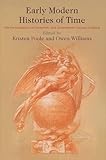Early Modern Histories of Time : The Periodizations of Sixteenth- and Seventeenth-Century England / ed. by Kristen Poole, Owen Williams.
Material type: TextSeries: Published in cooperation with Folger Shakespeare LibraryPublisher: Philadelphia : University of Pennsylvania Press, [2019]Copyright date: ©2020Description: 1 online resource (376 p.)Content type:
TextSeries: Published in cooperation with Folger Shakespeare LibraryPublisher: Philadelphia : University of Pennsylvania Press, [2019]Copyright date: ©2020Description: 1 online resource (376 p.)Content type: - 9780812296563
- English literature -- Early modern, 1500-1700 -- History and criticism
- English literature -- Early modern, 1500-1700 -- Periodization
- History -- Periodization -- History -- 16th century
- History -- Periodization -- History -- 17th century
- LITERARY CRITICISM / Modern / 16th Century
- Cultural Studies
- Literature
- Medieval and Renaissance Studies
- 820.9/0030722
- PR414
- online - DeGruyter
| Item type | Current library | Call number | URL | Status | Notes | Barcode | |
|---|---|---|---|---|---|---|---|
 eBook
eBook
|
Biblioteca "Angelicum" Pont. Univ. S.Tommaso d'Aquino Nuvola online | online - DeGruyter (Browse shelf(Opens below)) | Online access | Not for loan (Accesso limitato) | Accesso per gli utenti autorizzati / Access for authorized users | (dgr)9780812296563 |
Frontmatter -- Contents -- Introduction -- Periodization in Historiography and Literary Studies: An Overview -- Chapter 1. Periodizing the Early Modern: The Historian’s View -- Chapter 2. Time Boundaries and Time Shifts in Early Modern Literary Studies -- PART I. Religion -- Chapter 3. How Early Modern Church Historians Defined Periods in History -- Chapter 4. Periodization and the Secular -- Chapter 5. Trans-Reformation English Literary History -- PART II. Materiality -- Chapter 6. Time and Place in Shakespeare’s Stratford-upon- Avon -- Chapter 7. Much Ado About Ruffs: Laundry Time in Feminist Counter-Archives -- PART III. Poetics -- Chapter 8. The Period Concept and Seventeenth-Century Poetry -- Chapter 9. Love Poetry and Periodization -- PART IV. Shakespeare -- Chapter 10. Shakespeare, Period -- Chapter 11. Periodic Shakespeare -- PART V. Self-Emplacement -- Chapter 12. John Dryden and Restoration Time: Writing the Self Within Time, Through Time, Beyond Time -- Chapter 13. Did the English Seventeenth Century Really End at 1660? Subaltern Perspectives on the Continuing Impact of the English Civil Wars -- PART VI. Beyond Time -- Chapter 14. Space Travel: Spatiality and/or Temporality in the Study of Periodization -- Chapter 15. Always, Already, Again: Toward a New Typological Historiography -- Notes -- List of Contributors -- Index -- Acknowledgments
restricted access online access with authorization star
http://purl.org/coar/access_right/c_16ec
Early Modern Histories of Time examines how a range of chronological modes intrinsic to the sixteenth and seventeenth centuries shaped the thought-worlds of those living during this time and explores how these temporally indigenous models can productively influence our own working concepts of historical period. This innovative approach thus moves beyond debates about where we should divide linear time (and what to call the ensuing segments) to reconsider the very concept of "period." Bringing together an eminent cast of literary scholars and historians, the volume develops productive historical models by drawing on the very texts and cultural contexts that are their objects of study. What happens to the idea of "period" when English literature is properly placed within the dynamic currents of pan-European literary phenomena? How might we think of historical period through the palimpsested nature of buildings, through the religious concept of the secular, through the demographic model of the life cycle, even through the repetitive labor of laundering? From theology to material culture to the temporal constructions of Shakespeare, and from the politics of space to the poetics of typology, the essays in this volume take up diverse, complex models of sixteenth- and seventeenth-century temporality and contemplate their current relevance for our own ideas of history. The volume thus embraces the ambiguity inherent in the word "contemporary," moving between our subjects' sense of self-emplacement and the historiographical need to address the questions and concerns that affect us today.Contributors: Douglas Bruster, Euan Cameron, Heather Dubrow, Kate Giles, Tim Harris, Natasha Korda, Julia Reinhard Lupton, Kristen Poole, Ethan H. Shagan, James Simpson, Nigel Smith, Mihoko Suzuki, Gordon Teskey, Julianne Werlin, Owen Williams, Steven N. Zwicker.
Mode of access: Internet via World Wide Web.
In English.
Description based on online resource; title from PDF title page (publisher's Web site, viewed 25. Jun 2024)


